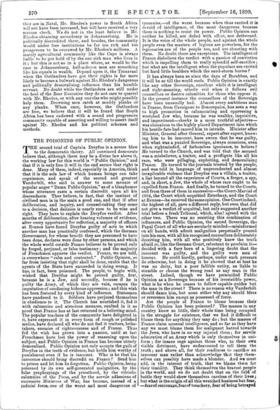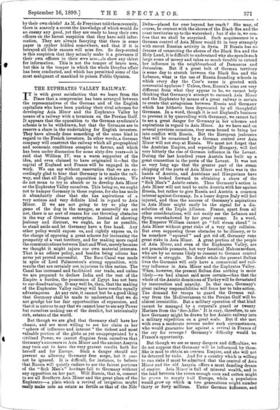THE POISONING OF PUBLIC OPINION. T HE second trial of Captain
Dreyfus is a severe blow to the democratic theory. All convinced democrats believe that, although there may be a divine law above it, the working law for this world is " Public Opinion," and that if it is only free it will in the end secure that right is done. Many of them, indeed, especially in America, think that it is the sole law of which human beings can take cognisance, and speak of the second and greatest Vanderbilt, who said in answer to some menace of popular anger " Damn Public Opinion," as of a blasphemer whose utterance casts a certain discredit upon all his descendants. They believe, in fact, that the instinct of civilised men is in the main a good one, and that if after deliberation, and inquiry, and counsel-taking they come to a decision, that decision is nearly sure to be wise and right. They have to explain the Dreyfus verdict. After months of deliberation, after hearing volumes of evidence, after every opportunity for reflection, a majority of officers at Rennes have found Dreyfus guilty of acts to which another man has practically confessed, which the German Government, for whose benefit they are presumed to have been done, declares were done by other persons, and which the whole world outside France believes to be proved only by forged, perjured, or false testimony ; and the majority of Frenchmen approve the verdict. France, we are told, is everywhere "calm and contented." Public Opinion, so far from insisting that right shall be done, exults that the agents of the State have succeeded in doing wrong. It has, in fact, been poisoned. The people, to begin with, wished that Dreyfus might be proved guilty, first, because he is a Jew, and secondly, because if he is guilty the Army, of which they are vain, escapes the imputation of condoning hideous oppression ; and this wish has been fostered by every kind of influence. Statesmen have pandered to it. Soldiers have perjured themselves in obedience to it. The Church has nourished it, fed it with calumnies and atrocious menaces, exulted in it as proof that France has at last returned to a believing mind. The popular teachers of the community have delighted in it, have expressed it in every form of rough or polished malice, have declared all who do not feel it traitors, bribe- takers, enemies of righteousness and of France. Thus fed the wish has grown into a passion, until at last. Frenchmen have lost the power of reasoning upon the subject, and Public Opinion in France has become utterly demoralised. Public Opinion not only accepts the guilt of Dreyfus in the teeth of evidence, but holds him worthy of punishment even if be is innocent. Who is he that his innocence should bring discredit on France ? Send him to prison and let him be forgotten. Public Opinion, being poisoned by its own self-generated malignities, by the false prophesyings of the priesthood, by the vitriolic calumnies of the Press, and by the servile adhesions of successive Ministers of War, has become, instead of a judicial force, one of the worst and most dangerous of tyrannies,—of the worst because when thus excited it is devoid of intelligence, of the most dangerous because there is nothing to resist its power. Public Opinion can neither be killed, nor defied with effect, nor dethroned. It is the voice of the whole people, and against the whole people even the masters of legions are powerless, for the legionaries are of the people too, and are shouting with them. No doubt there are exceptions. The intelligent of France disbelieve the verdict with a passion of conviction which is impelling them to really splendid self-sacrifice ; but what are the intelligent when the populace are excited but hard little boulders which the sand-storm buries ?
It has always been so since the days of Barabbas, and it will be so till the world cools. Public Opinion is exactly like any other Sovereign, excellent while it is intelligent and right-meaning, utterly evil when it follows evil counsellors or desires calamities for those who oppose it In the present instance the counsellors of the Sovereign have been unusually bad. Almost every ambitious man in France, from Cavaignac to Beaurepaire, has seen a way to high promotion in calumniating and oppressing a wretched Jew who, because he was wealthy, inquisitive, and impertinent—cheeky is a more truthful adjective— was obnoxious to the highly placed Department into which his hostile fate had caused him to intrude. Minister after Minister, General after General, expert after expert, know- ing him to be innocent, have sworn that he was guilty, and what was a puzzled Sovereign, always conscious, even when rightminded, of fathomless ignorance, to believe? He turned to the Church, and was told that the accused was a misbeliever, a traitor, and a profligate like all his race, who were pillaging, exploiting, and demoralising France. He turned to the journals trusted by the people, and was told in language of unprecedented and almost inexplicable violence that Dreyfus was a villain, a traitor, a liar beyond all the experience of Courts, a forger, a spy, and, in short, a Jew, the whole of whose race ought to be expelled from France. And finally, he turned to the Courts, and from three of them in succession—the Court-Martial of 1894, the Court which acquitted Esterhazy, and the Court at Rennes—he received the same opinion. One Court indeed, the highest of all, gave a different reply, but even that did not give a verdict of acquittal, but only suggested another trial before a fresh Tribunal, which, alas! agreed with the other two. There was no resisting this combination of influences, and Public Opinion, the sacred Sovereign, the Papal Court of all who are secularly minded—misinformed on all hands, with adroit malignities perpetually poured into his ears, with all his recognised counsellors deliberately deceiving him, with all who positively knew the truth afraid or, like the German Court, reluctant to proclaim it— decided with a fury born of a lingering doubt that the innocent was guilty, and the guilty were men of honour. He could hardly, perhaps, under such pressure do otherwise, but in doing it he showed that at best he was no deity, but a poor fallible entity, as liable to stumble or choose the wrong road as any man in the street. Indeed, though we have personified Public Opinion as a Sovereign because of his irresistible power, what is he when he ceases to follow capable guides but the man in the street ? There is no reason why Vanderbilt should damn him, but none either why any should bless or reverence him except as possessed of force.
Are the people of France to blame because their Public Opinion has been poisoned? The masses in any country know so little, their whole time being occupied in the struggle for existence, that we find it difficult to blame them for anything they may do ; but the masses of France claim unusual intelligence, and so far as they have any we must blame them for malignant hatred towards the Jews, who have in no way injured them ; for servile admiration of an Army which is only themselves in uni- form ; for insane rage against those who, to their own visible detriment, have endeavoured to tell them the truth ; and above all, for their readiness to sacrifice an innocent man rather than acknowledge that they them- selves can possibly have made a blunder. And we must add, in the interest of truth, that we blame them for their timidity. They think themselves the bravest people in the world, and we do not doubt that on the field of battle they would show themselves careless of their lives ; but what is the origin of all this wretched business but fear, —fearof espionage, fearof treachery, fear of being betrayed by their own chiefs? As M. de Freycinet told them recently, there is scarcely a secret the knowledge of which would do an enemy any good, yet they are ready to hang their own officers on the barest suspicion that they have sold infor- mation. They are always fancying that there is some paper in cypher hidden somewhere, and that if it is betrayed all their cannon will miss fire. So deep-rooted is this suspicion that they actually make it a grievance if their own officers in their own arsek.als show any thirst for information. This is not the temper of brave men, but this is the temper in which the whole Dreyfus affair has been conducted, and which has permitted some of the most malignant of mankind to poison Public Opinion.



































 Previous page
Previous page